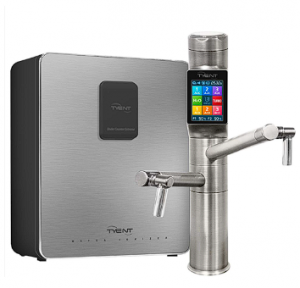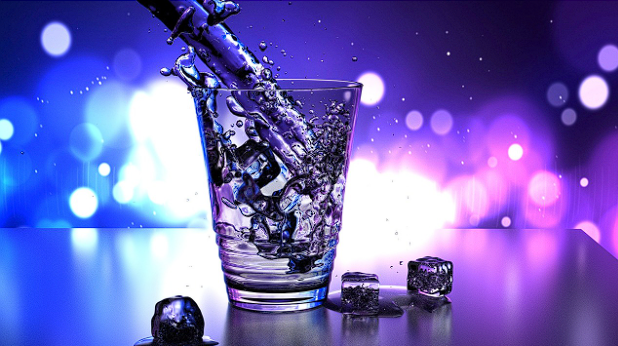As of 2023, more than 90% of Americans say they filter their drinking water at home, a rising trend. When asked why they chose to start filtering their water, 31% said it’s because they believe it to be healthier, while 52% said it’s because they want to be more environmentally friendly. However, if they are choosing to filter through a reverse osmosis (RO) water system, their assumptions may not be correct.
RO water systems may not be the clean water solution that they’re often billed as. In this article, we’ll unpack how RO water systems work, why they can actually harm your health and the environment, and better alternatives, like hydrogen water.
What is an RO Water System?
An RO water system is a water system in which pressure forces water through a semipermeable membrane to remove impurities, resulting in two streams of water. The RO water system then moves the treated water, called the permeate, to where it can be consumed. It also removes the rejected, contaminated water, called the concentrate.
Things to Consider About RO Water Systems
RO water systems are sometimes billed as a good way to ensure you have safe drinking water in your home, but these systems aren’t the miracle product some people claim. Let’s talk about what to consider before investing in an RO water system and why you should use other water filtration systems, like Tyent’s ionizers.
Depletes Water of Essential Minerals
Reverse osmosis water is essentially “dead” water. You might invest in an RO system because you believe it’s the most effective way to remove contaminants. But in some ways, RO water systems can actually be too thorough. These systems don’t differentiate between good-for-you minerals and bad-for-you pollutants.
Drinking reverse osmosis water for a long period of time can be overall detrimental to your health. Water without all its minerals is unstable and wants to re-mineralize itself, so it seeks out the minerals inside your body. It will find them, mainly in your teeth and bones, and attempt to leach them from your body. One study found that drinking reverse osmosis water over a long period of time had a direct correlation to osteoporosis, which makes your bones weak, brittle, and more breakable.
The World Health Organization (WHO) issued a warning against using water systems that remove important minerals for a prolonged period of time, reporting that drinking water deficient in calcium and magnesium, which RO water systems produce, can affect someone’s cardiovascular health, cancer risk, and even the health of their future children. On the other hand, Tyent’s ionizers add in even more helpful and healthful minerals, making your water even more powerful and an excellent addition to your daily routine.
Removes Vitamins
RO systems remove some contaminants, but they also remove many vitamins. Certain minerals make up important vitamins, which can often be found in drinking water. But when an RO water system removes those minerals, you’re not getting what you need to create and absorb those vitamins.
Consider one study that looked at why many people today suffer from Vitamin B12 deficiencies. The study found that people who regularly drink reverse osmosis water are more likely to have this deficiency, likely because RO water systems remove cobalt, which is a vital part of B12.
Excessive Water Waste
As discussed, reverse osmosis creates two streams of water: one you can drink and one you can’t. But it typically creates more water waste than consumable water.
The Environmental Protection Agency (EPA) reports that a typical RO water system generates five or more gallons of contaminated wastewater for every gallon of safe water created. Some of the more inefficient systems generate a staggering 10 gallons of rejected water for every gallon of treated water. Ionizers create less water waste, with some Tyent ionizers producing 40% less than even other ionizers on the market.
Ongoing Maintenance
The WHO also reported that RO water systems are not always clean of bacteria. The unstable water that RO water systems create dissolves organic substances, like bacteria, and they can then leech into the water, resulting in bacteria-contaminated drinking water. This aggressive water can also corrode your pipes, adding even more chemicals in your water.
If you intend to get an RO water system, expect frequent maintenance to keep bacteria and chemicals out of your water. Even then, it’s challenging to guarantee you’ll be completely free of these issues.
Does Not Remove All Dangerous Chemicals
If you’re choosing an RO water system to keep your water clean, it’s vital to know that these systems don’t actually remove all dangerous contaminants. Some contaminants that reverse osmosis doesn’t remove include dissolved gases, like hydrogen sulfide, which has been linked to dizziness, seizures, comas, and even death. It also doesn’t remove some pesticides, solvents, and volatile organic chemicals. Tyent ionizers remove more than 200 contaminants, creating safe, clean drinking water.
How RO Water Systems Work
The first step of the reverse osmosis process is to install your reverse osmosis filtration system, which also requires setting up an intake pump at the water source. Pre-treatment begins, in which larger solids like carbonic acids and sediments are removed from the water to protect the semi-permeable membrane. During this step, bacteria are also killed by oxidizing biocides like chlorine.
A high-pressure pump then moves the water toward the semi-permeable membrane. At this point, a pressure vessel lets the water make contact with the membrane. The energy put into the high-pressure pump is then redirected to the concentrate flow.
The water is then somewhat remineralized to protect the inside of the water storage and pipes. This is done by adding caustic soda or lime, which can help prevent corrosion. The water enters the post-treatment phase and is disinfected again against bacteria or pathogens that could have bypassed the filtration process. This process does not completely guarantee the elimination of bacteria, which means that some bacteria can still bypass this phase and leech into your water.
During this process, minerals that are good for you, such as potassium, which protects your internal organs, and zinc, which is essential for your circulatory system and immune system, are also removed, resulting in water with a low mineral count.
Best RO Water System Alternative
Knowing that RO water systems aren’t the best option to keep your water clean, what is a better choice? Tyent ionizers not only make your water cleaner but more nutritious and hydrating, too.
Tyent

Tyent creates water ionizers that go beyond what an RO water system is capable of. Not only do they remove more contaminants than RO water systems, including toxins, dangerous residues, pharmaceuticals, and heavy metals, but they also don’t remove essential minerals the way an RO water system does.
In fact, the ionization process adds more healthy minerals. With a Tyent water ionizer, you get all the benefits of clean, safe drinking water, plus the benefits of both alkaline water and hydrogen water. While alkaline water supports your digestive, bone, and immune health and is more hydrating than water alone, hydrogen water also boosts your metabolic health, athletic performance, cognitive health, and much more. These two powerhouse waters are created with just the push of a button with Tyent’s water ionizers.
Tyent ionizers are trusted by doctors and athletes around the world. If you’re considering an RO water system to remove pollutants, consider that Tyent ionizers use Dialpure filters. These filters have the same filtration power as kidney dialysis machines, which is why with Tyent you can say goodbye to over 200 dangerous contaminants, and hello to the nutrients and minerals your body needs.

Tyent Water Ionizers:
Why use Tyent’s water ionizer machines?
- Tyent is the only ionizer on the market that uses solid/mesh hybrid plates, which are essential in the electrolysis process to remove contaminants and add more molecular hydrogen.
- Tyent creates water with the most molecular hydrogen of any ionizer on the market.
- Tyent removes more contaminants than RO water systems. They even add more good-for-you minerals to your water, whereas RO water systems take out minerals your body needs.
- Tyent’s self-cleaning features enable you to keep your ionizer and water clean, whereas water produced by RO water systems can be so aggressive that you end up with bacteria and chemicals in your water created by corrosion.
- Tyent offers both above-counter and below-counter water ionizers, with sleek features fit for a luxury kitchen.
- Tyent uses one-touch technology, allowing you to get the alkaline or hydrogen water you want with just the press of a button.
- Tyent’s Dialpure filters are capable of removing more than 200 pollutants.
Try out a Tyent water ionizer.
Learn More About RO Water
Still considering an RO water system? Here are some common questions about reverse osmosis water.
Is RO water healthy to drink?
Reverse osmosis can produce safe drinking water, but it’s really meant to be a short-term option. In areas where clean, safe drinking water is scarce, RO water systems can treat brackish, contaminated water and make it safe to drink. While it’s a good short-term solution, it’s not a good option for long-term use in your home.
RO water systems create aggressive, demineralized water that can cause negative health effects over time. You’ll end up drinking water depleted of essential minerals, which can result in vitamin and mineral deficiencies and raise your risk for many diseases and health conditions. RO water systems can also increase your risk of drinking toxic metals and bacteria that have leached into the water.
A better option for long-term use is a water ionizer, which has the power to filter out pollutants while boosting your overall health with added benefits. Tyent ionizers filter out over 200 contaminants while providing the highest levels of antioxidants and molecular hydrogen possible.
What are the downsides of reverse osmosis?
Using an RO water system has numerous downsides, starting with the fact that getting water through reverse osmosis is extremely wasteful due to the abundance of wastewater it produces. In comparison, Tyent ionizers produce less wastewater than other ionizers on the market, with some Tyent ionizers producing 40% less water waste. Reverse osmosis also removes essential minerals during the filtration process, not just contaminants.
If you’re only drinking reverse osmosis water, you may not be getting the essential minerals your body needs to function. Even worse, your body may start pulling essential minerals from other places in your body, namely your teeth and bones, resulting in health problems like osteoporosis. Reverse osmosis water is also not as hydrating as alkaline water or hydrogen water, both of which you can get from Tyent’s ionizers. RO water also lacks the other benefits of Tyent water, such as anti-aging properties, immune system support, gut health benefits, and much more.
How long is RO water drinkable?
If you were to bottle and store RO water, it could last up to six months. But the main concern isn’t with how long RO water can be stored—it’s more important to focus on how to make your RO water system last. Without frequent maintenance, your system can deteriorate or grow bacteria. RO water systems have multiple filters and membranes, some of which should be changed as often as every six months, which can be an expensive investment.
How much does it cost to install an RO system?
Whole-house RO water systems can range between $750 and $7,500, depending on the size of your home. But it’s important to note that you’ll have to change the filters fairly frequently, which can result in higher overall costs.
Choose the Best RO Water System Alternative
You want safe, clean drinking water in your home, but installing an RO water system can introduce health risks. These water systems can be life-saving when used short term in areas where safe drinking water is scarce, but they are not meant for long-term use. Not only are these systems extremely wasteful, but they may harm your health in the long run.
Tyent ionizers not only remove more contaminants than RO water systems, but they add essential minerals, whereas RO water systems remove them. With a Tyent ionizer, you get proper filtration plus numerous health benefits, from better hydration to improved bone health.

![The Dangers of Reverse Osmosis Water [2024] hydrogen water](https://www.tyentusa.com/blog/wp-content/uploads/2020/08/Screenshot-2024-09-08-083127.png)







